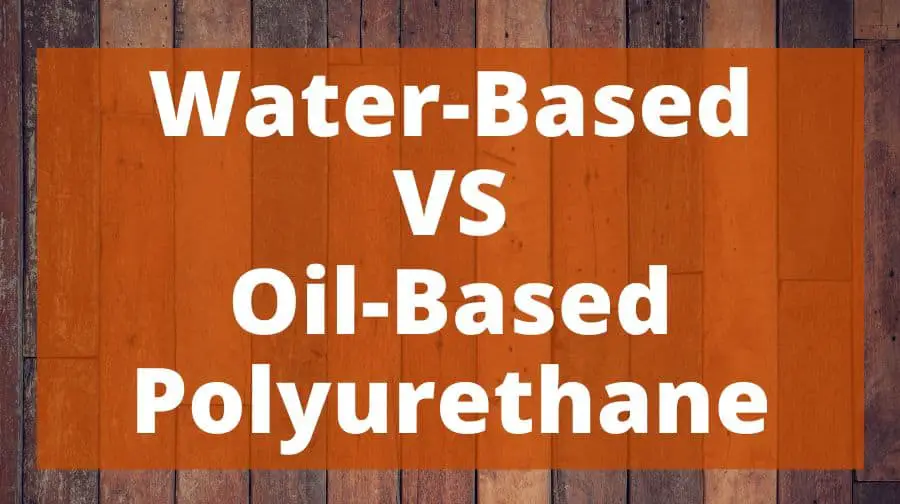
When it comes to protecting your hardwood floors, you have two main options: water or oil-based polyurethane. Both of these products have their pros and cons. So how do you choose which one is suitable?
In this blog post, we will discuss the differences between water and oil-based polyurethane, and help you decide which product is best for your needs.
Which Is Better: Water Or Oil-Based Polyurethane For Hardwood Floors?
It depends on several factors, including the type of hardwood flooring you have and your personal preferences.
Water-based polyurethane is more expensive than oil-based polyurethane. However, it dries more quickly and has very little odor. It also tends to be less durable than oil-based polyurethane.
Oil-based polyurethane is more common than water-based polyurethane, and it’s less expensive. It takes longer to dry and it has a strong odor. Many people also find that it yellows over time.
When you’re not sure which type of polyurethane to use, ask a flooring specialist at your local home improvement store for advice. Follow the manufacturer’s instructions carefully when applying either type of finish.
Subscribe to Wood Flooring Supply on YouTube
What Is Water-Based Polyurethane?
Water-based polyurethane is a type of sealant from water, resin, and oil. Use it to protect wood floors from scratches and other damage. It is less toxic than other types of sealants and dries more quickly.
Water-based polyurethane is a great choice for busy households with children and pets! It is also a good option for people with allergies, as it has little odor and is non-toxic.
What Is Oil-Based Polyurethane?
Oil-based polyurethane is a type of finish derived from petroleum. It is known for its high durability and resistance to stains and scratches; takes longer to cure and emits strong fumes.
This polyurethane is a popular choice for floors and furniture because it forms a hard and protective layer that will last for many years. When you are considering using this type of finish, take proper safety precautions and ventilation into account.
Oil-based polyurethane can apply with a brush, roller, or cloth, and comes in two varieties: water-resistant and non-water resistant. Water-resistant finishes are more expensive. But they will provide an extra layer of protection against moisture damage.
When you are looking for a durable and long-lasting finish, oil-based polyurethane is a great option to consider!
The Pros And Cons Of Water-Based Polyurethane
Water-based polyurethane is one of the most popular finishes for hardwood floors. It’s durable and has a low odor, making it a good choice for homes with children and pets. However, it doesn’t always give floors the same level of protection as oil-based polyurethane. It can get difficult to get a consistent finish.
Here’s a closer look at the pros and cons of water-based polyurethane:
- The biggest advantage of water-based polyurethane is that it’s much less smelly than oil-based. It also dries more quickly, so you can get back to using your floors sooner.
- A good choice when you’re looking for an eco-friendly option, since it doesn’t contain the harmful VOCs that are in oil-based finishes.
The downside of water-based polyurethane is that it’s not as durable as oil-based. You’ll need extra caution with your floors and take steps to protect them from wear and tear.
It can also get tricky to apply. So it’s important to follow the instructions carefully.
The Pros And Cons Of Oil-Based Polyurethane
Oil-based polyurethane is one of the most favored types of finishes for hardwood floors.
It provides a durable and long-lasting finish that can have easy cleaning and maintenance.
However, there are some drawbacks to using oil-based polyurethane as well.
One of the main disadvantages of oil-based polyurethane is that it takes a long time to dry. This turns into a problem when you’re trying to finish a project promptly. It can also get difficult to work with, as it’s sticky and smelly.
Another downside is that oil-based polyurethane is more susceptible to yellowing over time. This is due to the nature of the oil-based ingredients.
Despite these drawbacks, oil-based polyurethane is still one of the best finishes you can use for your hardwood floors! When you take the time to do it right, you’ll end up with beautiful and long-lasting results! Keep the above pros and cons in mind.
How To Decide Which Product Is Right For You – Water or Oil-Based Polyurethane
When it comes to choosing polyurethane for your hardwood floors, you have two main options: water-based polyurethane and oil-based polyurethane. Both have their pros and cons. So how do you determine the appropriate one for you?
Here’s a short overview of the differences between them:
Water-based polyurethane can raise the grain of the wood, so it requires more prep work.
Oil-based polyurethane has a longer time to dry with a powerful odor. But it’s easier to apply and doesn’t raise the grain of the wood.
So which one should you choose? It depends on your project and your preferences.
How Long Does Water-Based Polyurethane Last?
It depends on the traffic and wear your floors receive. In a busy household, you can expect to reapply every three to five years. In a less active home, it may only need every seven to ten years.
You’ll know it’s time to apply a new coat of polyurethane when the existing finish starts to show wear and tear, such as scratches, stains, and dullness.
To extend the life of your water-based polyurethane floors, clean them regularly with a gentle cleaner and avoid using harsh chemicals or abrasive scrubbers. You should also put mats at all entrances to help protect the floors from dirt and grit.
With proper care, your water-based polyurethane floors will continue to look beautiful for years to come!



